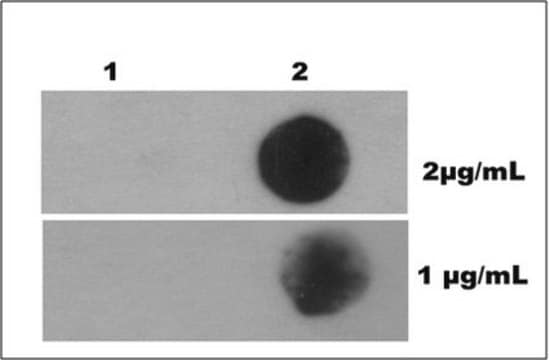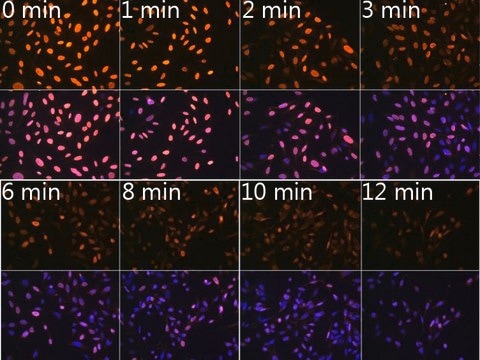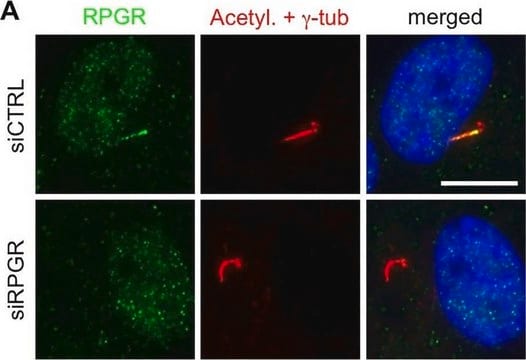ZMS1124
Anti-m6A Antibody, clone 17-3-4-1 ZooMAb® Mouse Monoclonal

recombinant, expressed in HEK 293 cells
Sinonimo/i:
m6A
About This Item
Prodotti consigliati
Origine biologica
mouse
Livello qualitativo
Ricombinante
expressed in HEK 293 cells
Coniugato
unconjugated
Forma dell’anticorpo
purified antibody
Tipo di anticorpo
primary antibodies
Clone
17-3-4-1, recombinant monoclonal
Nome Commerciale
ZooMAb® learn more
Forma fisica
lyophilized
Purificato mediante
using protein G
Reattività contro le specie (prevista in base all’omologia)
all
Confezionamento
antibody small pack of 25 μL
Caratteristiche più verdi
Waste Prevention
Designing Safer Chemicals
Design for Energy Efficiency
Learn more about the Principles of Green Chemistry.
Convalida avanzata
recombinant expression
Learn more about Antibody Enhanced Validation
sustainability
Greener Alternative Product
tecniche
dot blot: suitable
flow cytometry: suitable
immunocytochemistry: suitable
Isotipo
IgG1λ
Sequenza dell’epitopo
Unknown
Categoria alternativa più verde
Condizioni di spedizione
ambient
Temperatura di conservazione
2-8°C
modifica post-traduzionali bersaglio
unmodified
Descrizione generale
Specificità
Immunogeno
Applicazioni
Evaluated by DOT blot analysis with RNA oligos with m6A modification.
Dot Blot Analysis (DB): A 1:1,000 dilution of this antibody detected N6-methyladenosine in RNA oligos with m6A modification.
Tested Applications
Flow Cytometry Analysis: Flow Cytometry Analysis (FC): 1 µg of this antibody detected m6A in U2OS cells treated with 10 M BrdU, 24-28 h prior to UV-C treatment.
Immunocytochemistry Analysis: Immunocytochemistry Analysis (ICC): A 1:100 Dilution of this antibody detected m6A in U2OS cells treated with 10 M BrdU, 24-28 h prior to UV-C treatment.
Note: Actual optimal working dilutions must be determined by end user as specimens, and experimental conditions may vary with the end user.
Descrizione del bersaglio
Stato fisico
Ricostituzione
Stoccaggio e stabilità
Note legali
Esclusione di responsabilità
Non trovi il prodotto giusto?
Prova il nostro Motore di ricerca dei prodotti.
Codice della classe di stoccaggio
11 - Combustible Solids
Classe di pericolosità dell'acqua (WGK)
WGK 1
Punto d’infiammabilità (°F)
Not applicable
Punto d’infiammabilità (°C)
Not applicable
Certificati d'analisi (COA)
Cerca il Certificati d'analisi (COA) digitando il numero di lotto/batch corrispondente. I numeri di lotto o di batch sono stampati sull'etichetta dei prodotti dopo la parola ‘Lotto’ o ‘Batch’.
Possiedi già questo prodotto?
I documenti relativi ai prodotti acquistati recentemente sono disponibili nell’Archivio dei documenti.
Il team dei nostri ricercatori vanta grande esperienza in tutte le aree della ricerca quali Life Science, scienza dei materiali, sintesi chimica, cromatografia, discipline analitiche, ecc..
Contatta l'Assistenza Tecnica.








